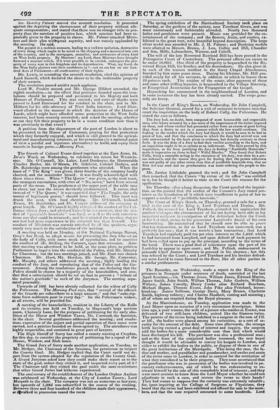In the Court of King's Bench, on Wednesday, Sir John
Campbell, the Solicitor-General, moved for a writ of certiorari to remove into that court the inquisition on the body of Robert Cully, the Policeman. He stated the case as follows.
The Jury had, no doubt, been composed of most honourable and respectable men, who where actuated by a due sense of the importance of the duties imposed
on them, and whose verdict had proceeded rather from an excess of good feeling
than from a desire to act in a manner which the law would condemn. On Laskin.-b to the verdict which the Jury had found, it would be seen to be bad in
point of law, and that the conclusion to which the Jury had arrived was not
only unwarranted by the facts given in evidence, but directly contrary to those facts. It was the duty of a Jury to find their verdict according to the facts, and an inquisition ought to be as certain as an indietmeat. The facts proved by this inquisition, so far front justifying the Jury in finding "Justifiable Homicide," made it imperative on them to find "Wilful Murder." They found that Robert Cully, being a constable acting in the execution of his duty, was slain by a per- son unknown, and the reason they gave for finding that the person unknown was not guilty of any other crime than that of justifiable homicide was, that no. Riot Act was read and no proclamation was made ordering the people to dis- perse.
Mr. Justice Littledale granted the writ ; and Sir John Campbell then remarked, that the Crown "by virtue of its office" was entitled to it, but he thought it better to state to the Court the reasons for the application.
On Thursday, after along discussion' the Court quashed the inquisi- tion. on the ground that the verdict of the Coroner's Jury stated pre- mises as the foundation of it which were insufficient in point of law to support a verdict of "justifiable homicide."
The Court of King's Bench, on Thursday, granted a rule for a new trial in the case of the King v. Lord `Fey/111am and Donlan. Mr. Polka.k, the counsel for Lord Teynham, grounded his appliCation for
another trial upon the circumstance of his not having been able to lay important evidence in exculpation of the defendant before the Court at the last trial, owing to the prosecutor Langford's denial of his own
handwriting. He maintained that he should now be able to prove that tee transaction, as fir as Lord Teynham was concerned, was a perfectly fair one ; that it was merely a loan transaction ; that Lord Teynhain had regularly paid ten per cent. interest on the 1,4001. which he had borrowed from Langford, and upon default of such payment he had been called upon to pay up the principal, according to the terms of the bond. There was a good deal of reluctance upon the part of his Lordship to appear in open court; and Mr. Pollock endeavoured to persuade Chief Justice Denman to proceed in his absence ; but this was refused by the Court ; and Lord Teynbam and his brother defend- ant were forced to come forward to the floor, like all other parties in a similar predicament.
















 Previous page
Previous page